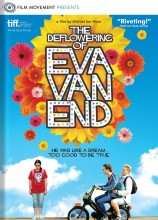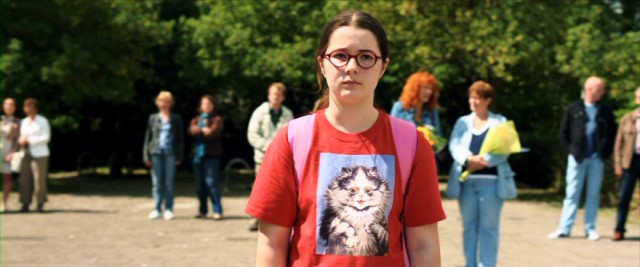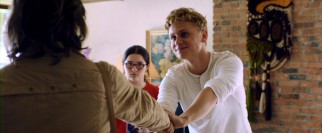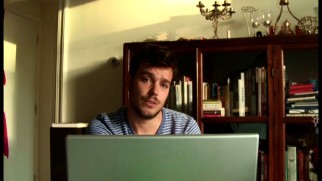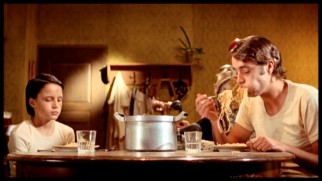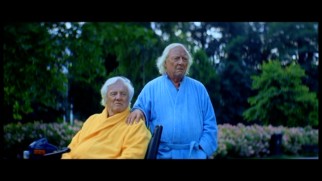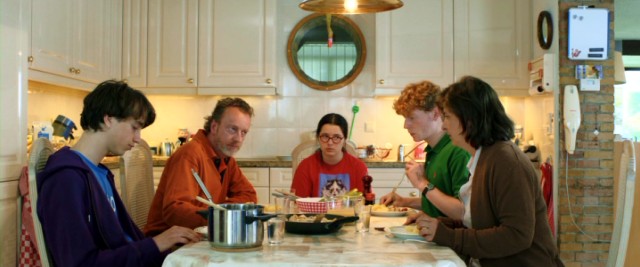The Deflowering of Eva van End DVD Review
Buy The Deflowering of Eva van End from Amazon.com: DVD • Instant Video
The Deflowering of Evan van End marks the feature debut of its writer-director, Michiel ten Horn. Though he is Dutch and so is this idiosyncratic dramedy, it may very well remind you of offbeat American independent films. The film spends a brief period of time with the van Ends, a Dutch family of five. A wholehearted character study, it divides its time evenly among the dysfunctional clan, making us very familiar with each member. Closest to a protagonist, the titular Eva (Vivian Dierickx) is a quiet, plump, homely girl in her early teens. (I'd probably liken her to Heather Matarazzo's Welcome to the Dollhouse character, if I'd ever seen that '90s Todd Solondz film.) Fond of pan pipes and clothes with cats on them, Eva is a social outcast whose existence seems acknowledged only by one friendly handicapped girl. Even Eva's family pays her little notice; no one hears her when she announces at the dinner table that the family will be hosting a German boy for the next two weeks as part of a school exchange program.
Eva's older brothers are of comparable age, but dissimilar in appearance and interests. The acne-riddled, mature 21-year-old Erwin (Tomer Pawlicki) is a floor manager at a home improvement store. He's in the process of moving out and in with his girlfriend. Middle child Manuel (Abe Dijkman) is a rude punk, entertained by racist jokes and masturbation races with his best friend (they face opposite directions) when he's not making enemies with his hook-ups.
The family's parents will soon celebrate their silver wedding anniversary (25 years) and are planning the party, even though frikadel factory supervisor Evert (Ton Kas) and housewife Etty (Jacqueline Blom) don't appear to be getting along very well these days.
Into this house comes Veit (Rafael Gareisen), a dreamy, worldly blonde German teen who quickly makes an impression on all of his hosts. Eva develops a crush on him, silently and from a distance. Erwin seems attracted to Veit too, suggesting he might be in the closet. Manuel shows the houseguest hostility, even when the two compete in an annual frikadel-eating competition Manuel regularly wins. Meanwhile, Veit opens the van End parents' eyes, the mother to the importance of meditation and the father to the joys of charity, which sees the Dad making a big donation to Veit's African Skype friend.
Deflowering relies on a formula, recently and delightfully employed by the French blockbuster The Intouchables and best exemplified in my mind The filmmaker is fully invested in these personalities and makes it easy for you to do the same, even if you can't relate to or sympathize with them. Truthfully, the latter tasks are a challenge, not due to any cultural distance but because the van Ends aren't an easy bunch to warm to. While he's worked exclusively in the Netherlands, writing and directing a number of shorts before and after this, ten Horn has an American sensibility to him. He even has some of the film play in English, making English language learning the chief purpose of the school exchange program.
The influence of Anderson seems unmistakable, especially near the end when the director uses slow motion on unremarkable action and moves the camera around to lap up crumbs from the family's life at the end of Veit's stay. Ten Horn even closes with a cover of The Beach Boys' "Sloop John B", a song that originally closed The Royal Tenenbaums before clearance trouble made Anderson settle for Van Morrison's perhaps even more fitting "Everyone" instead.
After making its premiere at the 2012 Toronto International Film Festival, Deflowering received theatrical release in the Netherlands last February. In July, the film reached the United States as "Year 11, Film 7" in Film Movement's Film of the Month Club. This week, that DVD hit general retail and is the subject of this review. VIDEO and AUDIO
The DVD's 2.40:1 anamorphic widescreen transfer is fine, but unspectacular. I say that as someone accustomed to reviewing Blu-rays, but even by DVD standards, the presentation isn't as dynamic as most contemporaries. The bilingual soundtrack is offered in Dolby Digital 5.1 and Dolby Stereo 2.0, with the latter strangely selected by the default. The 5.1 mix I chose satisfies without making a huge impression. The player-generated subtitles are clean, timely, and fairly comprehensive, although again, the clearer ones offered on Blu-ray have spoiled me a little.
BONUS FEATURES, MENUS, PACKAGING and DESIGN
The DVD's handful of extras begin with an English language interview of director Michiel ten Horn (4:44). It's certainly bizarre, as the filmmaker is questioned about the film and his career via video chat by an unidentified weirdo who's bathed in red light and appreciates an odd angle. You'd think this strange touch to be thematic, but the film's Skype conversations are far more ordinary.
Every Film Movement DVD includes a short film. This one has two, both of them written and directed by ten Horn.
Basta (13:23) sees two brothers playing a trick on their elderly mother in the shed they live in the clouds seemingly during World War II.
Less surreal and more satisfying, Arie (10:19) centers on an old grandfather in a retirement home whose beloved pet canary seems to become an old man in a yellow robe, The shorts give us some sense of where the director, whose study of animation manifests in some effects and transition cards, is coming from.
Beyond all that, we get Deflowering's trailer (2:01) and a one-screen biography of the director.
The disc opens with trailers for The Iran Job, Three Worlds, and La Sirga, all of which are also found in the Trailers from the Film Movement Catalog section, along with theatrical previews for Somers Town, Adam's Apples, and The Rage in Placid Lake.
The Film Movement promo that automatically plays after the disc-loading trailers is also viewable from an "About Film Movement" page.
The main menu places listings over a scored montage of screen-filling film clips.
The studio's use of a clear keepcase enables the cover artwork's reverse side to display remarks explaining this film's selection for the line and from ten Horn discussing the adolescent experience that inspired the film.
CLOSING THOUGHTS
Easy to get into but tough to finish completely satisfied, The Deflowering of Eva van End should interest those with a taste for dark, offbeat American indie comedies. Film Movement's DVD presents this Dutch film with valuable, relevant extras and evident care.
Buy The Deflowering of Eva van End from Amazon.com: DVD / Instant Video
|
Related Reviews:
DVDizzy.com | DVD and Blu-ray Reviews | New and Upcoming DVD & Blu-ray Schedule | Upcoming Cover Art | Search This Site
Rushmore • The Royal Tenenbaums • Bottle Rocket • The Ice Storm • Accidents Happen • Gentlemen Broncos • Terri
New: Frances Ha • We're the Millers • I Give It a Year • Broken • The Way, Way Back • Adore
European Films: The Intouchables • In a Better World • Autumn Sonata • Thale • Life Is Sweet
Hans Brinker, or the Silver Skates • Pusher • Smart People • Following • Son of Rambow
